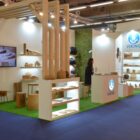Why choose cork?
Cork is a material with several benefits, which put it at an advantage when the opportunity arises to choose a natural material to replace others.
Here are its main features:
Light
Cork is made up of 80% gaseous matter, weighing 0.16 grams per cubic centimeter. It is a very light and buoyant material.
Elastic/compressible
Its very flexible cell membranes make cork compressible and elastic. When subjected to strong pressure, the gas in the cells is compressed and greatly reduces its volume (up to half its width), which recovers when it is freed from that pressure.
Cork is the only solid that, when compressed on one side, does not increase the volume on the other, that is, it adapts to variations in temperature and pressure without its integrity as a sealant being compromised.
Waterproof
Due to the suberin and ceroids present in cork, this material is practically impermeable to liquids and poorly permeable to gases.
For the same reason, cork does not rot, which is one of the factors why it is considered one of the best sealants on the market.
Insulator
Cork is an excellent thermal and acoustic insulator. For this reason, it is transformed into corks, to better protect wine and spirits against temperature variations or contamination.
This material is used for waterproofing infrastructures, foundations, and subfloors, for acoustic and thermal insulation and for final coatings.
Of all natural substances, cork has the greatest thermal and acoustic insulation capacity.
Fire retardant
Cork is a natural heat retardant. It does not produce a flame and does not release gases during combustion.
Durable
It is a very wear-resistant material. Its structure means it is less affected by impact and friction than rigid coatings.
Hypoallergenic
This raw material does not absorb dust, therefore, it does not cause allergies or pose a risk to asthmatics.
Biodegradable, recyclable and renewable
It is a natural raw material, 100% biodegradable, recyclable and renewable.





